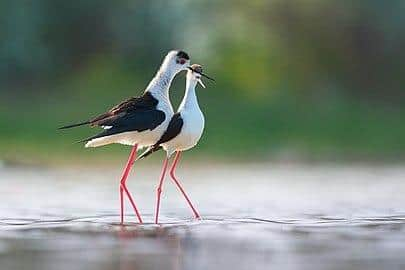First bird breeding success for rare black-winged stilts in Doncaster
and live on Freeview channel 276
The Trust believes this to be the most northerly breeding success for this species ever in the UK.
Four eggs were laid about a month ago and chicks were spotted by a visitor on Tuesday afternoon.
The chicks take their first steps away from the nest soon after hatching, but remain vulnerable and it will be a few days before they can fly.


Black-winged stilts don’t breed in the UK every year but up to ten pairs breed in some years across southern England.
The pair arrived at Potteric Carr reserve on 16th May and were soon prospecting for a nesting site, tempted by the wetlands with rich mudflats where they can feed.
Andy Dalton, Operations Manager at Yorkshire Wildlife Trust said; “The nest was vulnerable to predation by other birds and mammals, but the parents were quite aggressive in and around the nest, and have been busy chasing off all manner of birds.
"Our amazing team of volunteers and reserve staff have kept an eye on the nest round the clock to help protect the nest from egg collectors, who sadly are still an illegal threat to wild birds.”
Andy added; “It’s been a tense wait but we’re overjoyed – Potteric Carr is a green oasis on the fringe of Doncaster, surrounded by busy roads and industrial development – the conservation work we do here has a significant impact for wildlife including rare species like black-winged stilts.
"Green spaces, wherever they are, can provide a much-needed home for our declining wildlife.
“The team at Potteric Carr worked hard over winter to create ideal conditions for birds like these and it’s been incredible to see these results.”
Work was completed earlier this year on Piper Marsh, where the stilts nested, to reduce the amount of reedbed and remodel the islands.
"This created ideal feeding areas for a variety of wading birds including curlew and lapwing. Black-winged stilts also prefer very bare islands to nest on, with some shallow water to feed in.
Black-winged stilts don’t tend to return to the same nesting site, but the work will benefit more resident and regular migrant birds for years to come. This year, lapwing, oystercatcher and several duck species have also bred in the area for the first time in recent years. Bitterns are spotted throughout the year and a purple heron was also seen at the reserve this week.
Visitors hoping to see the birds can visit Potteric Carr Nature reserve from 9am to 5pm where it’s a 30 minute walk from the visitor centre to Piper Marsh www.ywt.org.uk/potteric-carr
*Black-winged stilts are scarce visitors to the UK. They mainly breed in Europe mainly around the Mediterranean, and around the world.
Conservationists think climate change is making black-winged stilts move north – in this case it could be due to very hot weather in Spain that has made wetlands too dry, or the prolonged period of southerly winds pushing them further north, or both.
Black-winged stilts are migratory and mainly winter in northern Africa.
